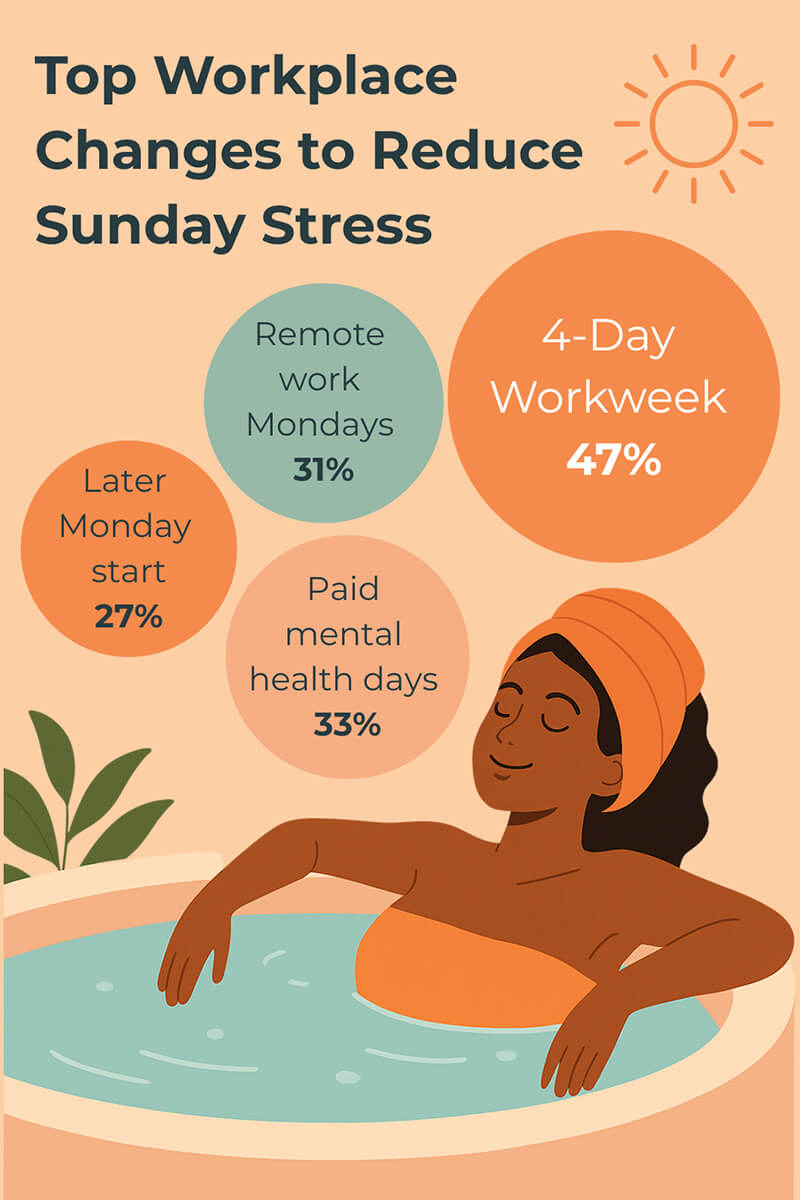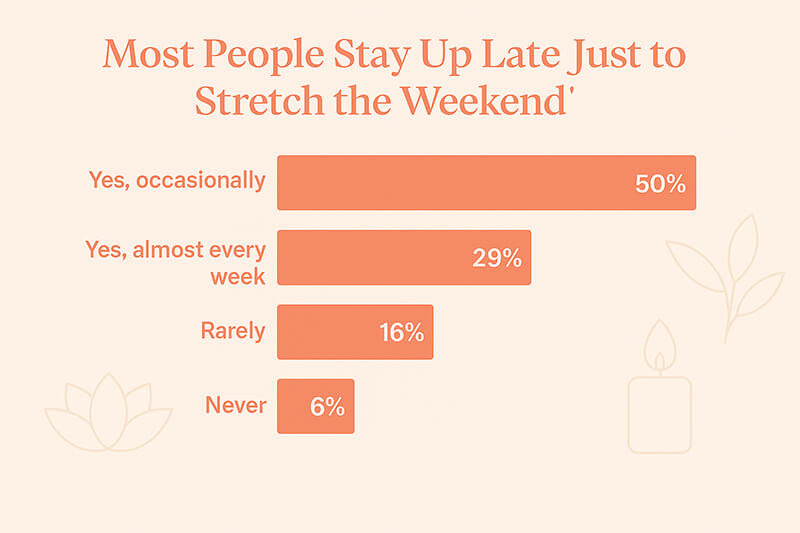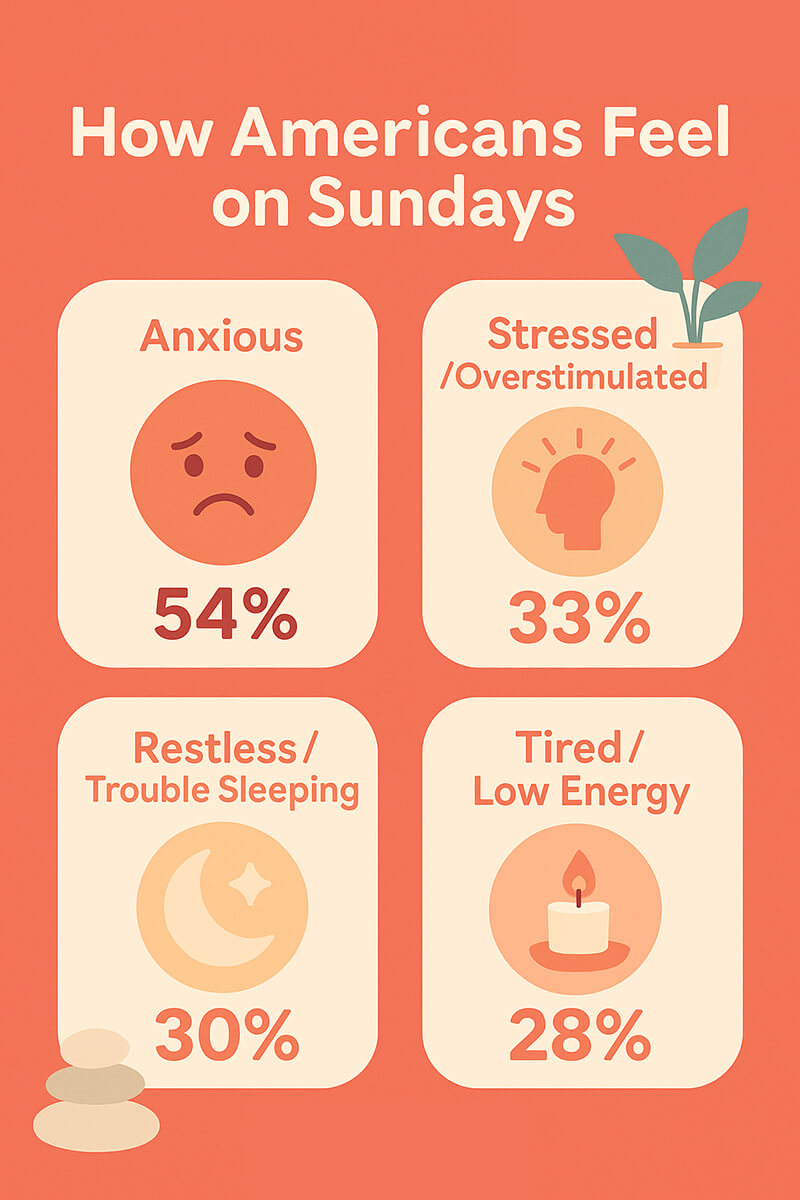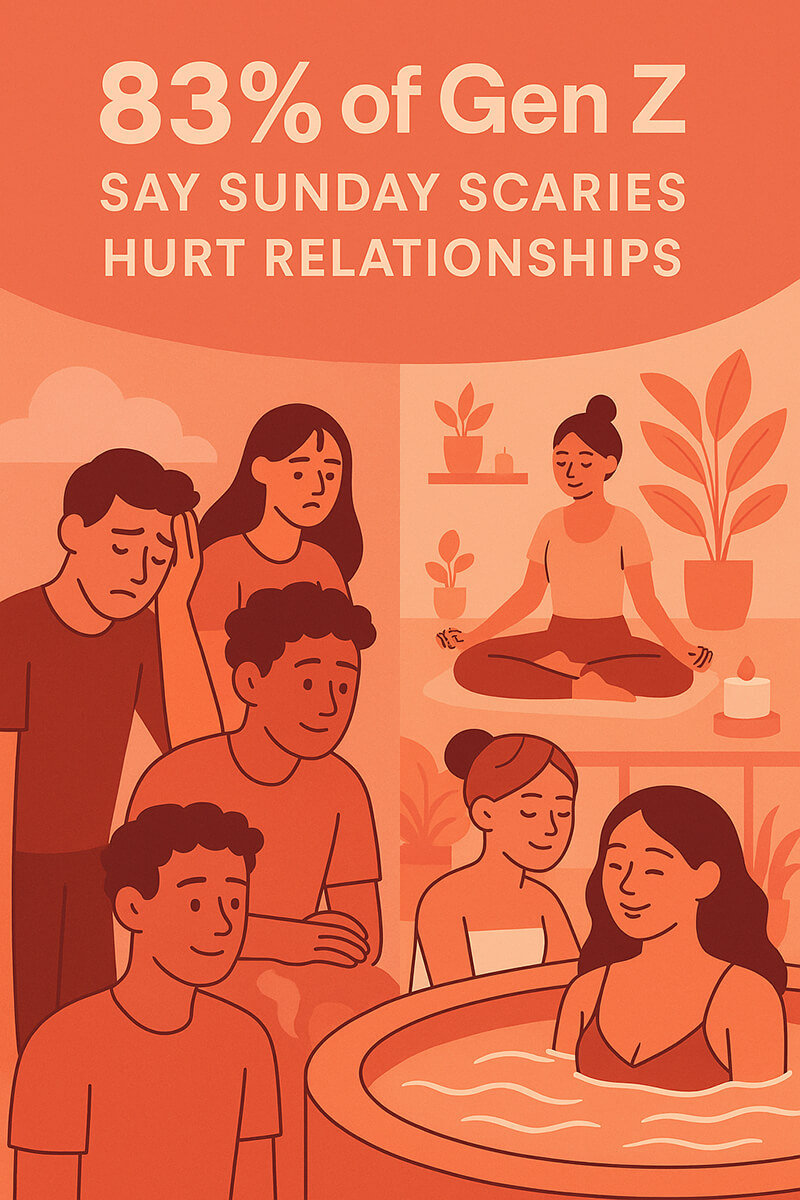“Sunday Scaries” Sweep the Nation: Half of Workers Now Want a Four-Day Week.
As Sunday afternoon turns to evening across America, a wave of anxiety, restlessness, and even dread washes over millions, a phenomenon so common it has earned a name: the “Sunday Scaries.”
A new survey reveals just how deeply and widely this pre-workweek stress is shaping the nation's mental health, relationships, and daily habits.
Key Findings.
- 47% of full-time workers say a shorter workweek would help reduce Sunday stress.
- 50% of those with Sunday Scaries have actively stayed up later.
- 54% of Americans typically feel anxious as the weekend ends.
- 24% of Americans report feeling depressed on Sundays.
- 27% of men versus just 13% of women report that drinking alcohol or using substances helps them relax on Sundays.
- 83% of Gen Z say the Sunday Scaries have caused issues with personal relationships.
Nearly Half of Employees Say a 4-Day Work Week Could End the Sunday Scaries.

The traditional five-day workweek feels outdated for many Americans. Workers say that reducing Sunday anxiety may take more than personal coping strategies; it could require systemic change.
- 47% of full-time workers say a shorter workweek would help reduce Sunday stress.
This finding aligns with global pilot programs showing that a four-day workweek can boost both productivity and well-being. For many, less time at work and more time to recharge could mean starting Mondays with energy instead of exhaustion.
Americans Sacrifice Sleep for Saturday “Me Time”.

When weekends feel too short, people carve out personal time even if it costs them sleep.
- 50% of people with Sunday Scaries stay up later on Saturdays, knowing it makes Sunday harder.
This bedtime habit shows how much people value moments of freedom. Unfortunately, sacrificing rest often worsens anxiety and makes Monday mornings feel heavier. Building healthier routines could help restore balance.
More Than Half Feel Anxious as the Weekend Ends.

What was once a quirky phrase has become a widespread reality. For many, the shift from weekend freedom to weekday responsibility has become a Sunday ritual that stirs restlessness and unease.
- 54% of Americans report feeling anxious as the weekend ends.
This stress doesn't stop on Sunday night. It can spill into poor sleep, irritability, and difficulty concentrating, setting the tone for the entire week ahead. Over time, unchecked anxiety contributes to burnout, making it harder for employees to stay engaged at work.
Healthy Habits Are Already Making a Difference.
Not all news about the Sunday Scaries is gloomy. Many Americans are already taking action to reduce their stress and it's working.
- 23% of respondents say they've made lifestyle changes that help them feel better on Sundays.
This shift reflects a growing focus on personal wellness routines. From mindfulness and exercise to practices like cold plunging or hot tub hydrotherapy, people are finding positive ways to take control of their Sunday evenings and start the week with a clearer mindset.
Sundays Leave Nearly a Quarter of Americans Depressed.
Beyond anxiety, Sundays bring heavier emotions for some.
- 24% of Americans say they feel depressed on Sundays.
The transition from relaxation to responsibility can take a toll, particularly for those already feeling stretched thin. While personal coping strategies help, workplaces that prioritize employee wellness can make a meaningful difference. Small shifts, like flexible schedules or wellness perks, could help people enter the week with more optimism.
Men vs. Women: The Surprising Divide in How We Handle Sunday Stress.
Not everyone approaches Sunday stress in the same way. Gender can play a role in how people choose to unwind.
- 27% of men say they use alcohol or substances to relax on Sundays, compared with 13% of women.
While these numbers reflect different coping mechanisms, they also highlight an opportunity to encourage healthier ways of handling stress. Stretching, meditation, cold plunging, or spending time in a hot tub are simple rituals that combine stress relief with wellness, providing something to look forward to at the end of the weekend and helping ease the Sunday Scaries while setting a positive tone for the week ahead.
Americans Are Optimistic About Beating the Sunday Scaries.
The survey revealed a hopeful trend: many people aren't giving up; they're planning ahead.
- 38% say they plan to make changes in the future to reduce their Sunday stress.
This forward-looking attitude shows momentum toward healthier lifestyles. It's a sign that Americans aren't simply accepting Sunday dread as the norm. They're motivated to try new approaches to feel more balanced and energized before Monday rolls around.
Gen Z Relationships Are Taking the Hardest Hit.

For younger workers, the Sunday Scaries don't just impact mood; they ripple into social lives and relationships.
- 83% of Gen Z say the Sunday Scaries negatively affect their personal relationships.
This generation places a high value on balance and connection, so when stress creeps in, it creates more friction. If weekends leave young professionals too anxious or drained to connect with others, relationships suffer. Employers that prioritize wellness and flexibility may see stronger engagement from this group in return.
Simple Workplace Shifts Could Ease Stress for Millions.
Employees don't just want sweeping reforms; they're asking for small, realistic adjustments that make Mondays easier to face.
- 18% want paid mental health days
- 16% want the option to work remotely on Mondays
- 14% want later start times on Mondays
These ideas highlight that improving well-being doesn't always require massive change. Even small adjustments can help employees start the week in a healthier, more positive headspace. Companies that adopt these shifts may see not only happier workers but also greater productivity.
Simple Habits to Make Mondays Easier.
While workplace changes can help, employees can also take simple steps to make Sundays less stressful. Creating a calming Sunday night ritual, whether it's hot tubbing, cold plunging, or taking a starlit stroll, can end the weekend on a positive note and set the tone for the week ahead. Adding pleasant activities to your weekday calendar also makes Mondays easier to face. Think outside the box: plan on getting up a few minutes early to watch the sunrise with your coffee, schedule a midweek lunch with a friend, or make a standing appointment to unwind in a nurturing space, like debriefing with your partner in a warm hot tub. These small, intentional choices can help replace dread with something to look forward to.
Summary
These statistics underscore that the Sunday Scaries are not just a fleeting mood, but a pervasive force impacting lives, work, and well-being from coast to coast. With half of working Americans now calling for changes like a four-day workweek and record numbers reporting anxiety, depression, and strained relationships, the Sunday Scaries have become a clarion call for both cultural and workplace reform.
Methodology
To understand how Americans approach stress, rest, and the “Sunday Scaries”, we surveyed 1,000 adults across the country. Participants answered a series of questions about their emotional states, coping behaviors, and routines on Sundays, as well as how work, finances, and personal relationships influence their ability to reset before the week ahead. Responses were analyzed by demographic groups to identify trends and disparities.
Fair Use Policy
Users are welcome to utilize the insights and findings from this study for noncommercial purposes, such as academic research, educational presentations, and personal reference. When referencing or citing this article, please ensure proper attribution to maintain the integrity of the research. Direct linking to this article is permissible, and access to the original source of information is encouraged.
For commercial use or publication purposes, including but not limited to media outlets, websites, and promotional materials, please contact the authors for permission and licensing details. We appreciate your respect for intellectual property rights and adherence to ethical citation practices. Thank you for your interest in our research.
Find a Dealer.

Find a Dealer.
Count on your local Caldera Spas dealer to help make your experience easy and enjoyable.
